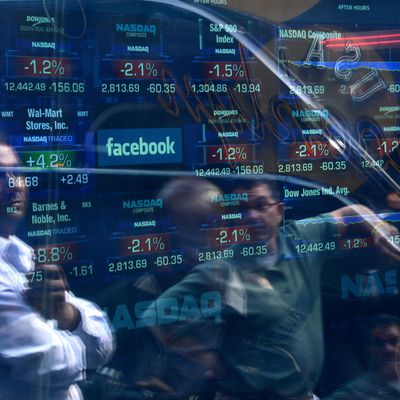
On March 19, 2000, the New York Times published a Q&A with Matthew Johnson, the chief Nasdaq trader for Lehman Brothers. It had been a mixed week in the markets – the Nasdaq had fallen off its all-time highs, but the S&P 500 had gained a few percentage points – and Johnson was called in to answer the question on every Times reader’s mind: Was the tech bubble about to burst?
Not really, Johnson replied. “I think Nasdaq’s short-term correction was certainly necessary … But every indication is that the numbers are going to be good, in some cases very, very good for tech stocks. It looks like our bull market continues.”
He was exceedingly wrong, of course – the tech bubble was about to burst in spectacular fashion, and take the bull market with it. In the two years after Johnson’s Q&A was printed, the Nasdaq fell 60 percent.
I thought about Johnson’s Q&A last week, as the Nasdaq fell 3.1 percent, and some of the most fabled tech stocks saw their prices slide by double-digit percentages. On CNBC and elsewhere in the business press, commentators lined up to rationalize the market slide in the same way Johnson had – saying that this was just an overdue correction, that smart money was still long tech stocks, that reason would soon prevail.
On an intellectual level, I agree with 2014’s bubble skeptics. I nodded along to Goldman equity strategist David Kotok’s recent “reasons this isn’t a tech bubble” report. Kotok is right on the fundamentals – when it comes to measures like price/earnings ratios, forward growth expectations, and the number of companies going public, what we’re seeing today is nowhere near as crazy as what happened in 2000.
But the tricky thing to parse is whether reason and rational analysis are going to matter this time. Historically, market crashes are often as much about narrative and emotion as they are about fundamentals. This goes doubly true with tech-led markets, which investors don’t understand nearly as well as blue-chip rallies. If you go back and look at market reports from the spring of 2000, what sticks out is that the incidents that provoked the most selling in the Nasdaq were relatively minor. One, a speech by then-President Bill Clinton and Prime Minister Tony Blair about open access to genetic data, sent the Nasdaq biotech index down 12 percent, and the overall Nasdaq down 4 percent. The second, a few weeks later, was the collapse of settlement talks in Microsoft’s antitrust case with the Department of Justice, which sent the Nasdaq down more than 7 percent on fears that Microsoft’s reign was coming to an end.
Neither of these fear-making events ended up having long-term market implications. Clinton and Blair’s announcement about what became the Human Genome Project didn’t crush the profits of biotech companies. And Microsoft eventually got off in its antitrust case with a slap on the wrist. But when the market is in a heightened state of fear, even minor signs of trouble ahead can turn caution into panic.
The possibility of history repeating itself – even absent the same fundamentals we had in 2000 – is why, privately, Silicon Valley executives will tell you that they’re starting to gird themselves for the worst. Tech start-ups are hoarding cash in anticipation of a crash. Venture investors are thinking about tightening their purse strings. The IPO pipeline has become a dangerous place to be.
Given how much money has been made by tech investors over the past several years, is it possible for market psychology to become more cautious without tipping into irrational fear? I’m not so sure. The investing community is much more comfortable with tech stocks than it was in 2000 (when dot-coms were still viewed by many as novelties), but despite the massive growth of the internet and the mainstreaming of tech businesses, many large investors still remember 2000 and 2001 as some of the worst years of their careers, and will overcompensate on the side of caution in order to avoid going through it again.
Soon – maybe even this week – the market will return a verdict on the state of the tech industry, and the lofty valuations that are being assigned to many players in the space. Companies like Facebook and LinkedIn will retain either something close to their recent valuations, and the current state of affairs (what critics call a bubble) will be reaffirmed — or, publicly traded tech will continue to slide and everyone from analysts to venture capitalists will take the message that the sector is overvalued. If that happens, tech companies from Google on down to three-person start-ups will get substantially cheaper, and the venture capital spigot may begin to shut. The entire emotional range of the 2000 crash – greed, fear, contrarian optimism, sudden panic – could be dug up and enacted all over. We don’t have a historical antecedent for a small, contained tech crash. All we have is 2000, and it’s easier to replay an established narrative than create a new one from scratch.
If you really wanted to predict next week’s market performance, in other words, you’d be better off calling a historian and a shrink than a stockbroker. Today’s market isn’t indicative of a 2000-style tech bubble, but it won’t matter if investors decide it looks close enough.





























